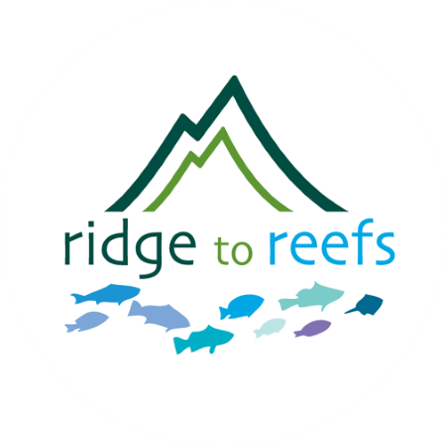Technical Implementation
Upcoming Projects
These are the first seven of the 28 recommended projects. All 28 were designed with local partners and serve important functions in the protection and restoration of the watershed. Work is planned in the coming years to continue the implementation of these efforts.
Traditional Taro Cultivation: Restoration and Food Security
Studies performed by the Palau International Coral Reef Center have shown that traditional taro patches can trap and retain over 95 percent of sediment and over 90 percent of nutrients that flow into them. For this reason, Ridge To Reefs decided to restore an overgrown taro patch hydrologically connected to Airai Bay. Traditional taro cultivation areas in Palau are increasingly threatened by sea level rise and salt water inundation, risking the very food security of the Palauan people and placing the resilience of a major dietary and cultural staple at risk. In addition to having immediate environmental benefits, this project will identify the most salt-water resistant cultivars of Native Palauan Taro and propagate these varieties for further research, improvement, and use.
Jane’s Farm: Sustainable Farming Methods
Jane’s Farm is one of the larger farms in the Airai watershed. They partnered with our work trialing agro-ecological production methods. Ridge to Reefs assisted with trials of field buffer strips and the use of vetiver plantings on contour for slope stabilization. We also assisted with the production of essential oil based pesticides, compost, bio-fertilizers, fish hydrolysate, and biochar based soil amendments to improve production. This resulted in reduced production costs, reduced use of synthetic fertilizers/pesticides, and improved soil health and crop yields. Our team is also working toward establishing Jane’s Farm as a demonstration farm where other local farmers can have an immersive experience implementing these strategies.
Chin Farm & Airai Elementary: Water Treatment
A leaking septic site was identified on the Chin Farm, close to Airai Elementary. This site had an ephemeral stream running directly through it and was carrying septic effluent directly into a stream flowing into Airai Bay. Homeowners at the site were complaining of standing water and a strong sewage smell. The project team amended the soils heavily with coconut coir, wood chips, and crushed biochar. We also planted 600 vetiver plants directly into this amended leachfield. Vetiver grasses are highly effective at treating large volumes of water and removing excess nutrients from the soil.
Sakuma Farm: Soil Stabilization
Mr. Sakuma's Farm is one of the larger farms in the Airai Watershed. This project focused on immediately stabilizing an abandoned road that was experiencing significant erosion. During precipitation events, this area was exporting large amounts of sediment to the stream below the farm which drains into Airai Bay. The project team constructed vetiver sediment traps on contour along the steepest areas which experience the greatest erosion rates. We planted more than 700 vetiver plants to immediately stabilize this degraded road.
Road Stabilization: Soil Amendments
Multiple sloped sites along the compact road were experiencing severe erosion. Our project team selected one site that was particularly eroded and trialed the use of vetiver planted on contours. This soil had very little plant growth and was almost like a bituminous coal. Our team amended the soil to improve growth and plant establishment, and planted vetiver on contour in the areas experiencing the greatest soil loss. The primary goals of this early action project were to immediately stabilize rapidly eroding areas while also trapping sediment.
Chin Farm: Student Involvement
After doing site visits we determined that there was significant soil and nutrient loss from the Chin Farm. These soils and nutrients were flowing down slope into a perennial stream draining into Airai Bay. In collaboration with Airai State Medal Ngediull Conservation Area Rangers and the Palau Community Action Agency, Ridge To Reefs instructed over 30 students from Airai Elementary School on the theory and practice of riparian buffer strips. Students were trained in the construction and use of A-frame levels. They then assisted in planting vetiver and lemongrass on the contour as an edge-of-field practice. This was designed to trap sediment and reduce soil and nutrient transport into the stream below the farm plot.
Ngarasesb Maas: Traditional Knowledge
The Ngarasesb Maas are the local women’s group who grow food for their communities. The Ma'as are the traditional holders of agricultural knowledge and ethnobotany and ethnopharmacology. They pass down this knowledge to their daughters and granddaughters, perpetuating the cycle of traditional Palauan cultural and agricultural knowledge. Ridge to Reefs and our project team worked to support the Ma'as in pursuing sustainable production practices. This community engagement is a way to bolster local food production and food security, decrease export of nutrients, sediment, and farm pesticides to the nearby stream, and a great opportunity for us to learn more about native Palauan plants and traditional agroforestry methods. Ridge To Reefs, PCC-CRE, and PCAA assisted by building a compost shed, providing a high quality wood chipper, assisted in the production of organic biochar and fish charcoal based fertilizers, and provided a backpack sprayer for naturally derived pesticides. All of these activities improve the environmental security, food security, and community economic security.








